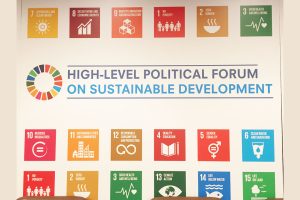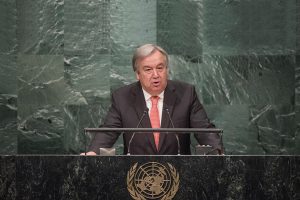By UN Department of Economic and Social Affairs (DESA)
When UN Member States adopted the 2030 Agenda for Sustainable Development in 2015, it was unprecedented in its scope and ambition. At the halfway point, it is clear that collaboration is the only way to address global challenges whether climate change, conflict, or future pandemics. It is also clear that the UN can play a vital role in this regard. Achieving the SDGs depends on robust and effective multilateralism, but this means rallying political will and commitment.
Multilateralism is now more crucial than ever. Since 2015, the UN has revamped its development system with a revitalized Resident Coordinator system and bolstered UN country teams. These teams have been providing strategic policy support, collaborating on large-scale programs and facilitating access to finance and other means of SDG implementation. They are well positioned now to work across siloes, supporting the integrated approaches to the SDGs that will have multiplier effects and accelerate progress.
In his 2023 Special Edition SDG Progress Report, ‘Progress towards the Sustainable Development Goals: Towards a Rescue Plan for People and Planet,’ the UN Secretary-General highlights the ongoing challenges to maximizing the effectiveness of the UN development system to support the SDGs, and what needs to be done to address them.
Ensuring that the UN system “steps up to the mark”
As part of this Rescue Plan, the Secretary-General urges Member States to continue strengthening the UN development system. This means boosting the capacity of the multilateral system to address the underlying structural weaknesses that have limited progress towards the SDGs – including the international financial architecture – as well as to tackle new challenges that have emerged since 2015.
As the Progress Report reminds us, “[t]here are no excuses not to be ambitious.” This applies to the UN system as well as Member States and other stakeholders. In resolution 72/279, the UN General Assembly (UNGA) presented a “funding compact” for the UN development system, which called for revitalized Member State support, especially through increased core funding for the development system, matched by increased transparency, coherence, and accountability in the UN organizations themselves. Progress has been made in realizing this compact, but there is more work to do.
In his report, the Secretary-General also calls for capitalizing the Joint SDG Fund by at least USD 1 billion by September 2024 and implementing an effective model to fully and sustainably fund the Resident Coordinator system over the long term, while urgently filling short-term resource gaps. This will allow all entities of the UN development system to strengthen capacities, find synergies between actions at regional and national levels, and ensure that they are well positioned to advance inclusive transformations for sustainable development.
The Summit of the Future in 2024 will offer a rich opportunity and political momentum to further revitalize the UN development system, including by bolstering global governance. An ambitious outcome at this Summit will position the UN system to support Member States’ actions for SDG delivery and to address longstanding roadblocks and emerging development challenges. It is a chance to agree on investments in global institutional capacity to anticipate, prepare, and reclaim the UN’s founding role as an advocate for future.
* * *
This article concludes a five-part series by the UN Department of Economic and Social Affairs (DESA), published in partnership with IISD. Focusing on the SDG Progress Report special edition themed, ‘Towards a Rescue Plan for People and Planet,’ the series puts forth areas of collective action necessary to turn things around so we can deliver on the promise of the 2030 Agenda.



